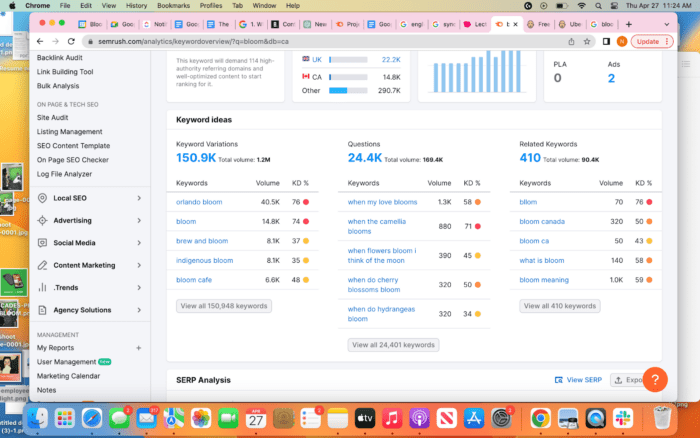With all the recent AI developments, many day-to-day tasks in advertising have evolved and are now somewhat seemingly being replaced by this powerful technology.
Could the same be true of keyword research regarding search marketing campaigns?
Paid ad keyword research involves identifying the most relevant and high-traffic keywords for your ad and feeding this information to the algorithm. Doing so helps the machine learn faster, resulting in better ad performance and higher conversion rates.
Back in the day, it was all up to marketers to do the hard work when it came to keyword research. More recently, Google suggests using their AI tools to let the algorithm recommend keywords and experiment with your ad to find the best-performing keywords for your content.
Sounds like a win-win, right? You can just upload your ad copy, any base list of keywords you want and let Google make the ads for you, without doing any of the grunt work!
Well, in theory, yes. But let’s not get too excited. While Google will target keywords and experiment with your ad, solely relying on this approach will likely result in wasted ad spend and decreased performance, especially in the early stages when the algorithm is still learning. It’s important to implement keyword research done by humans who understand your brand and intended message to optimize your paid ads effectively.
In this blog post, we’ll discuss the importance of keyword research and how to do it more effectively to get the most out of your paid ads.
Automation in Google Ads
First, let’s define what kind of AI we’re talking about regarding paid ads. Are brands solely relying on ChatGPT to brainstorm keywords?
Not quite (at least they shouldn’t be), but increased automation within the Google Ads platform itself has allowed advertisers to streamline their campaigns and improve their results more quickly if done well.
One recommended feature of Google Ads is Broad Match types, which allows advertisers to reach a wider audience by showing their ads to users who search for related keywords. This type of approach can help save time by automating the process of selecting and bidding on relevant keywords.
Another feature leveraging automation in Google Ads is Performance Max, which is designed to help advertisers maximize their campaign performance across multiple channels and ad formats. This feature uses machine learning to optimize bids and targeting, which helps advertisers reach their target audience more effectively and efficiently.
While both tools have their strengths, solely relying on them as opposed to combining AI with human-conducted keyword analysis is a risky choice. We’ll dive deeper into the details shortly.
The Benefits Of Doing A Solid Keyword Research
You may be thinking, why can’t I just tell AI what my business is all about and let it come up with keywords for me? Wouldn’t that achieve the same thing?
While it’s not impossible, AI isn’t yet at a level that would allow for this to be done efficiently and cost-effectively. The primary advantage of human keyword research is the human brain’s ability to apply critical thinking and judgment to determine the best keywords to target. Human researchers can take into account factors like user intent, industry-specific terms, and competitor analysis to identify keywords that will best target your target audience.
Further, humans can better identify potential long-tail keywords and other nuances that AI may not pick up on. Human keyword research is the ability to adapt and pivot strategy based on emerging trends and changes in the industry or marketplace. In contrast, AI may struggle to keep up with rapidly evolving trends and user behavior patterns. While AI alone can certainly play a helpful role in supporting and supplementing your keyword research, the expertise and insights of a human in conjunction with AI can ultimately lead to more accurate, relevant, and effective results.
Why Feeding The Algorithm Correctly is So Important
In order to effectively use Google Ads and avoid wasting money and time, it is crucial for humans to provide the algorithm with the right information. This is because it relies on data such as keywords, target audience, and ad copy to determine the relevance of an ad and its placement within search results.
If keywords are entered into the algorithm without much consideration, it can increase the likelihood of your ad being displayed to the wrong audience, which may lead to wasted unnecessary clicks and quicker depletion of your budget.
In addition to depleting your budget, using inaccurate or irrelevant keywords in your advertising can result in poorer quality leads and consume the valuable time of your team in the case of a lead generation campaign or missed sales and decreased revenue in the case of an e-commerce campaign. Either way, it does not have the most positive outcome.
The Benefits of Negative Keyword Research
Paired with normal keyword research, negative keyword research can work wonders when it comes to honing in on your intended audience.
Negative keyword research, for those unfamiliar, is essentially a filter for advertisers to specify the terms they don’t want their ads to appear for. Take a look at this example, where “Bloom” came up with the following related keywords.

This goes to show how irrelevant things can get if relying solely on generic terms and the algorithm to determine which are the most relevant keywords.
To get around this problem, if we notice that none of these keywords is the right fit for our product or service, we can use them as negative keywords to better direct traffic and avoid attracting the wrong people.
To best set ourselves up for qualified leads, setting “Orlando”, “Cafe”, “ Brew” and “Indigenous” in this case as negative keywords would be a good place to start, as this would ensure we avoid our ads coming up when people are evidently searching for something completely unrelated to our agency.
Techniques and Tools for Keyword Research
One quick and easy way to find relevant and high-performing keywords is to implement what we at Bloom call, a discovery or “fishing” campaign. We allocate a small part of the budget to a separate campaign and let the algorithm come up with keywords based on a broader starting list, which helps us discover new keywords we may not have thought of. This approach also allows us to identify negative keywords, which helps us filter out unrelated traffic. It’s a cost-effective way to test and find new keywords without risking the performance of our primary campaign.
Use Keyword Research Tools
There are also many keyword research tools available out there, some of our favourites being Google Keyword Planner, Ahrefs, Moz, and SEMrush. These tools can help you identify new keywords, evaluate their search volume, and understand how competitive they are.
Analyze Your Competitors
Look at the keywords your competitors are targeting, and see if there are any gaps in their strategies that you can exploit.
Use Long-Tail Keywords
Longer tail keywords are often better than short-tail ones because they are more specific and targeted, resulting in higher-quality traffic. They can also be less competitive, making it easier to rank for them, and often also have higher conversion rates since they more closely match the user’s intent.
With some luck, this article has, at the very least, served as a reminder that the art of keyword research is not dying but rather evolving. Using the human brain supplemented with the moderate use of AI, keyword research can become more powerful and effective than ever before.
If you could use a hand with any of this, don’t hesitate to contact us, we’d love to help you level up your paid ads!
Read it first:
Get new articles delivered to your inbox
ABOUT THE AUTHOR
Xurxo Vidal
COO @ Bloom




Share this: